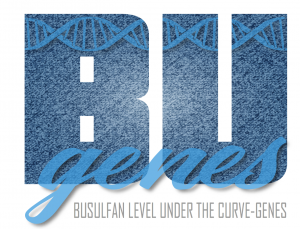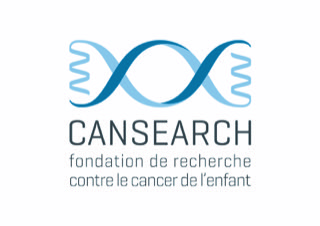d) BuGenes Study

Implementation of Pharmacogenetics in the Busulfan Dosage Regimen in Children Undergoing Hematopoietic Stem Cell Transplantation: A Prospective Multicenter Randomized Clinical Trial
Customized dosing of busulfan prior to hematopoietic stem cell transplantation (HSCT) in children is crucial to ensure both treatment efficacy and reduction of its toxicity. Since the latter are closely correlated with busulfan levels in the blood, dose personalization would aim to “target” therapeutic blood levels that optimize the clinical outcomes of the transplant. The BuGenes study addresses this important question by comparing two approaches to determining the initial busulfan dose during conditioning before transplantation. The first method takes into account factors such as the patient’s age, sex, and weight for dose calculation. The second, more innovative method also incorporates pharmacogenetic data by analyzing the patient’s genetic characteristics, notably the GSTA1 gene.
The objective is to determine which of these approaches offers better precision in busulfan dosage and in predicting treatment effects. To do this, patients participating in this study will be randomly assigned to receive either a genetically optimized dose or a dose determined without considering their genetics. Concurrently, the study aims to evaluate the impact of various genetic and non-genetic factors on clinical outcomes, such as relapses and post-treatment toxicities. The underlying hypothesis is that considering the patient’s genetic context will improve the predictability of busulfan blood levels, thereby reducing toxicity risks and improving the survival of treated children. The results of this study are expected to provide essential information to guide future clinical recommendations on busulfan dosage in children and adolescents before HSCT.
To our knowledge, no study has yet aimed to determine the best busulfan dosing strategy in children, nor to compare the effectiveness of incorporating a genetic marker such as GSTA1-based groups in this process. This is therefore a first in the field of pediatric oncology in Europe! The results of this research could potentially influence current recommendations regarding drug dosage by proposing a personalized pharmacogenetic approach for children. Finally, the adoption of personalized doses could ensure more uniform drug exposure throughout treatment.
This study, approved by the Cantonal Commission for Ethics in Human Research of Geneva in April 2021 for the Swiss sites of Geneva, Basel, and Bern, began patient recruitment in June 2021 in Geneva, and in October 2021 in Basel and Bern. It respectively received authorization in 2023 from ethics committees in France for the sites in Paris, Lyon, Marseille, and in Italy for the site in Monza. Additionally, it is expected to include patients from medical centers in Canada, Australia, and Denmark, with ongoing efforts to obtain approvals from the relevant regulatory authorities to extend the study to these different sites. The objective of this study is to include a total of 260 patients. Currently, 17 patients have been recruited in the study in Geneva, 2 patients in Bern, and 2 in Basel. The recruitment rate will be intensified once the study is approved by the competent authorities of the other participating countries, scheduled for 2024.
